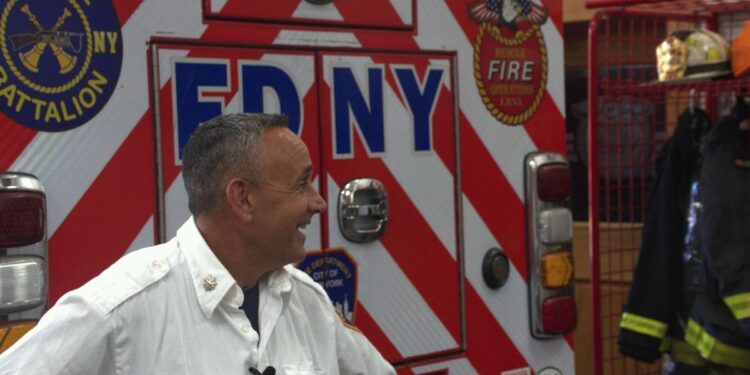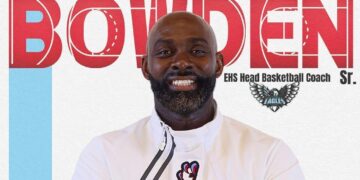NEW YORK – Every September 11, the names of the nearly 3000 people who died during the September 11, 2001 attacks are read at the 9/11 commemoration ceremony at the 9/11 memorial for Joe Downey, one name stands out among the rest.
On September 11, 2001, Raymond Downey died while helping rescue those trapped in the World Trade Center towers at the age of 63.
When Joe, a rescue operations battalion chief for the New York Fire Department, got to the towers to help with the rescue operations, he asked if anyone had heard from his father, Raymond. When he was repeatedly told no one had heard from him, he knew his father might be in trouble and grew worried. He later learned his father was dead.
When he was missing after the collapse of the Twin Towers, Raymond’s wife, Rosalie Downey, found a folder in his case. The folder was labeled “that a’ boy.” Inside the folder were letters from people he had helped, thanking him. Raymond never acknowledged the letters to his family, instead choosing to keep his accomplishments to himself.
In 1995, Raymond’s humility and drive to help led him to Oklahoma City.
Then President Bill Clinton and then Governor Frank Keating thanked Raymond for his work. Keating, a Catholic himself, knew Raymond was a Catholic as well. So he gave Raymond a set of rosary beads as a token of his appreciation. According to Raymond’s daughter, Marie Tortorici, he wore them every day until they broke. After they broke, he always had them in his pocket.
It is believed he died with them in his possession. The beads have not been found since.
Following 9/11, the Spirit of Oklahoma, a rescue truck, was gifted to the New York Fire Department in 2002 after Oklahoma students raised nearly $500,000 for the truck. It was gifted as a thank you to the New York firefighters, including Raymond, who helped with the recovery operations following the Oklahoma City bombing. In 2021, the truck was returned to Oklahoma.
During the Oklahoma City bombing clean-up and recovery, Raymond served as the FEMA Operations Chief. He served in the same position during multiple hurricanes, including Hurricane Hugo.
In addition to the Oklahoma City bombing, Raymond also responded to the Atlanta Olympics bombing.
One of the last times Raymond was heard from before his death was when he was making sure others were safe.
Raymond was helping civilians near the Marriott Hotel by the World Trade Center. While there, he told two young firefighters to help elsewhere and return when he said it was safe. He never had the opportunity to tell them it was safe.
“A lot of people have said, ‘If it wasn’t Ray Downey ordering me, I would not have left,’” Joe said. “There was a little fear of my dad’s voice; he put a little fear in people.”
“It saved their lives.”
Helping others and making sure they were safe and cared for was one of the older Downey’s missions in life. He was not a father fond of hugs and kisses, according to Joe.
“He was a caring person; he would not miss any of our events or whatever we did, great supporter. I’d like to give him a big bear hug; you know, get one back from him,” Joe said.
Nonetheless, he selflessly cared for others. It was obvious to those around him, even though he rarely mentioned it.
Following in his fathers’ footsteps, in 2005 Joe traveled to New Orleans to help with the rescue operations during Hurricane Katrina.
Raymond Downey was also a founding member of the FEMA Urban Search and Rescue Task Force. The FEMA Urban Search and Rescue Task Force now has 28 teams across the United States.
The elder Downey’s impact on the tactics of modern urban search and rescue is hard to understate. He was ultimately the godfather of urban search and rescue as it is carried out today.
According to a firefighter with the Fire Department of New York, rescue operations in New York would not be where they are today without Raymond Downey.
He authored the book “The Rescue Company.” In the book, he offers guidance on how to start a rescue company. He specifically outlines the equipment and operational planning that is necessary.
He also filmed a series of videos teaching people how to carry out rescue operations.
Operationally, he was at the top of his field. But he also saw the bigger picture and what might happen next.
Following the 1993 World Trade Center bombing, Raymond was a member of the Gilmore Commission. After the bombing, he said, “It’s not a matter of if, but when,” referencing a potentially larger, more devastating attack on American soil.
Many of his colleagues, and those he helped, called him “God,” “master of disaster,” or Poppy. Mainly his grandchildren called him Poppy.
Joe hopes to emulate some of his father’s qualities and instill them in the Rescue Operations teams of the Fire Department of New York, which he helps lead. He hopes to carry on his father’s selflessness and drive to help those in need.
Kevin Eagleson is reporting from Gaylord News’ Washington bureau this fall as part of an OU Daily scholarship.
Gaylord News is a reporting project of the University of Oklahoma Gaylord College of Journalism and Mass Communication. For more stories by Gaylord News go to GaylordNews.net
Want to reach a local audience and grow your business?
Our website is the perfect platform to connect with engaged readers in your local area.
Whether you're looking for banner ads, sponsored content, or custom promotions, we can tailor a package to meet your needs.
Contact us today to learn more about advertising opportunities!
CONTACT US NOW




